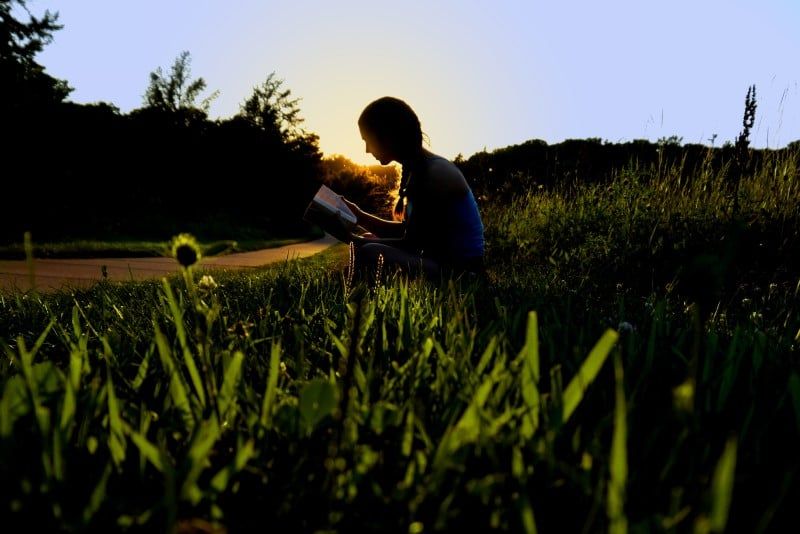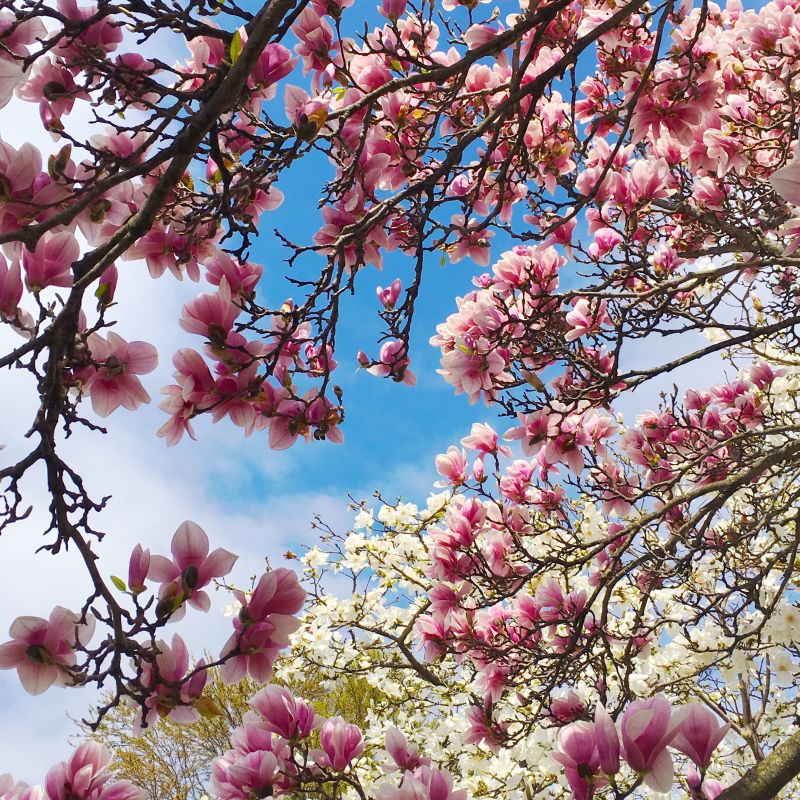College convinced me that poetry wasn’t for me.
As a reader and wannabe writer, I had loved poetry since childhood. (It’s surprisingly commonplace in children’s books.) I read my first poems in the unpretentious pages of Dr. Seuss, Jack Prelutsky, and Shel Silverstein. Most kids I knew had a weathered copy of Where the Sidewalk Ends or A Light in the Attic.
My first taste of “grown-up” poetry was the aptly named anthology 100 Famous Poems. Sometimes my parents asked my brothers and me to read aloud from it on family road trips. (When we weren’t arguing or eating Doritos in the backseat.)
I didn’t understand a lot of what I read—much of it was grim 19th-century stuff about graveyards and lost love and ships at sea—but it fascinated me. It was like hearing a new language. Even then, I knew I wanted to be fluent in poetry.
When I was ten, my grandparents gave me a worn scrapbook that had belonged to my great-grandmother. The scrapbook was full of poems—in faded spidery script—that my great-grandma had written in 1918 when she was just a teenager.

I was thrilled. This scrapbook was my first realization that my great-grandma had once been young. She hadn’t always lived downtown in a high-rise apartment with a conch shell on her coffee table. She hadn’t always worn bifocals and moved slowly. Once upon a time she had been young and full of poetry.
It was the first time I realized that ordinary people could be poets. People like my great-grandmother. Maybe people like me.
I began to fill a notebook with poems of my own. I wrote recklessly with a blue ballpoint pen, without knowing the rules or how it all worked. My scratchy 4th-grade handwriting was terrible and full of scribbled out words, and the verses were heavy with emotion and cliché. I wrote about thunderstorms and my best friend and the summer Olympics.
Later as a teenager, I began to read all the poetry I could get my hands on—Langston Hughes and Emily Dickinson. Walt Whitman and Maya Angelou. I discovered that poetry could be protest. It could be funny. It didn’t have to rhyme.
But when I started college, poetry suddenly became the realm of specialists. In that stratified world, poetry belonged only to people who majored in Creative Writing or wanted to be English professors.
Poems became specimens that needed to be prodded and analyzed, far beyond the grasp of average students like me. Poetry began to intimidate me. It made me feel underdressed. It dropped names I didn’t know.
In my college journalism classes I learned to write practical things like obituaries and press releases and recaps of city council meetings where people argued about concrete. There was little room in this particular world for poetry. Accuracy, objectivity, and deadlines mattered most. This is when I not only stopped writing poetry, I stopped reading it too.

For many years, my church hosted an annual arts conference. One spring, years after I graduated from college, poet and musician Micah Bournes was one of the teaching artists at the conference. He gave a dynamic spoken word performance and taught a workshop about poetry.
Bournes isn’t a lofty academic, and his poetry is about real life—faith, racism, social justice. He began his workshop by addressing common misconceptions about poetry and showed a clip of soul and jazz poet Gil Scott-Heron from the 1980s. In the clip, Scott-Heron makes the point that “poetic” shouldn’t mean pompous or confusing. Poetry is communication, he says, but instead when people attempt to write poems they think they have to be “deep” or complex.
Bournes went on to teach that poetry is the language of emotion. He described writing poetry as a spiritual practice that can shape who we are. His workshop reopened poetry to me. I started reading (and sometimes writing) it again and I haven’t stopped.
As I’ve spent the past few years diving back into poetry, I’ve learned that I actually need poetry in my life. Here’s why:
Poetry slows me down.
Naomi Shihab Nye—a celebrated poet herself—made this beautiful observation:
“When you live in a rapidly moving swirl, you can only view your surroundings with a glance. Poetry requires us to slow down, to take time to pause.”
If you read a poem quickly, you miss it. The words may scroll past your eyes, but the meaning is lost. Often, with all the information available to me—news stories, recipes, blog posts, status updates—my mind ricochets all day long. Poetry doesn’t allow for this. It invites me to slow down.
I recently wrote about my experience with anxiety. One thing I didn’t mention is the part that poetry has played in that journey. As often as possible, I try to begin my day by reading a few poems. It can often help set my mental rhythm for the whole day.
Poetry invites me to pay attention.
It’s no secret that in our world today, our attention is fragmented. (Anyone else ever find themselves scrolling the internet while watching TV while eating a meal? Guilty as charged.) For me, poetry has become an antidote to that temptation.
Mary Oliver, my favorite poet, said this:
“To pay attention. This is our endless and proper work.”
What we give our attention to matters. Just as poetry invites me to slow down, it also invites me to stop multi-tasking. To pay attention not only to the poem itself but the ideas and concepts it’s expressing. To pay attention to the world right now.
Poetry connects with my emotions in ways that prose can’t.
This is true whether I read or write poetry. Once I was in a bookstore and impulsively grabbed a copy of Thirst by Mary Oliver. As I stood in the aisle, reading the book, the poems unexpectedly started to unearth a deep grief I had been carrying and give me words for it. I bought the book, and still read it when trying to process difficult emotions or when I’m struggling in my faith.
Poetry has a way of resonating with the parts of ourselves we have yet to articulate, including our emotions.

When I first decided to start reading poetry again, it was daunting. I didn’t know how. I had a blog at the time (kind of), so when National Poetry Month came around, I decided to find and share a poem each day. I repeated the practice the following year. This regular habit of seeking out one poem at a time was all it took.
If you’re new to reading poetry or are returning to it after a long hiatus, find one poem to read and see where it leads. (April is National Poetry Month, so it’s an ideal time to get started.) For me, a poem-a-day practice eventually led me to new poets, poetic forms, time periods, and subject matter. Here are some of the poems I found back then if you’re looking for a place to start:
“How to Read a Poem: Beginner’s Manual” by Pamela Spiro Wagner
“Stealing Bread” by Micah Bournes
“Famous” by Naomi Shihab Nye
Unpacking a Globe by Arthur Sze
“truth” by Gwendolyn Brooks
“The Daughter” by Carmen Giménez Smith
“Forty Years” by Mary Oliver
“Imaginary Conversation” by Linda Pastan
“1950” by Bruce Dethlefson
“New Clothes” by Julia Alvarez
“Let America Be America Again” by Langston Hughes
“Spring Storm” by William Carlos Williams
Do you have any favorite poems or poets? I’d love to hear about them in the comments so I can add them to my reading list!
(And a little disclaimer: Poetry is protected by copyright like any other written work. In order to share it in full on a website—or elsewhere—you need permission from the writer. That’s why instead of sharing full poems, I’ve provided links to the websites that have received permission to publish these works.)



